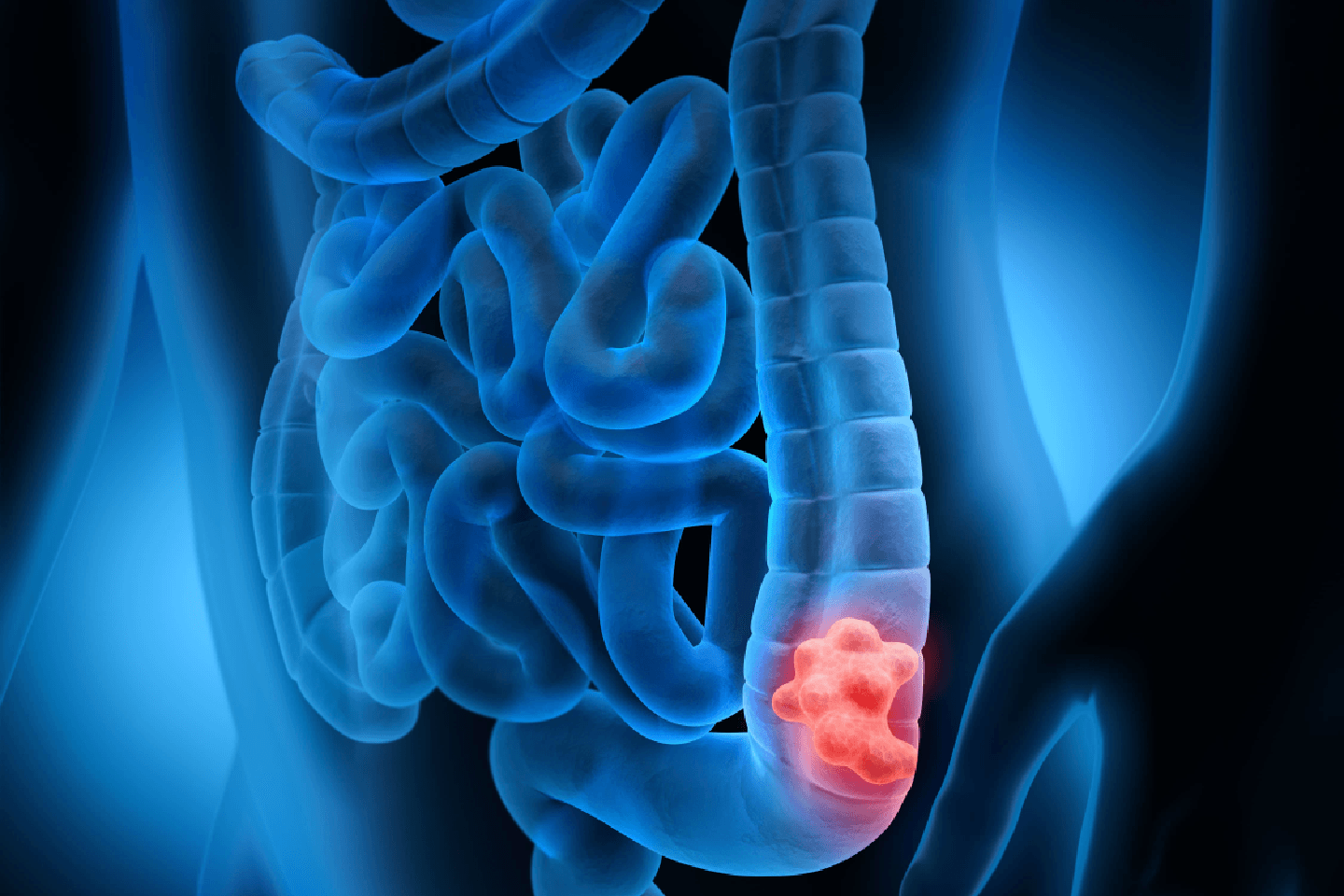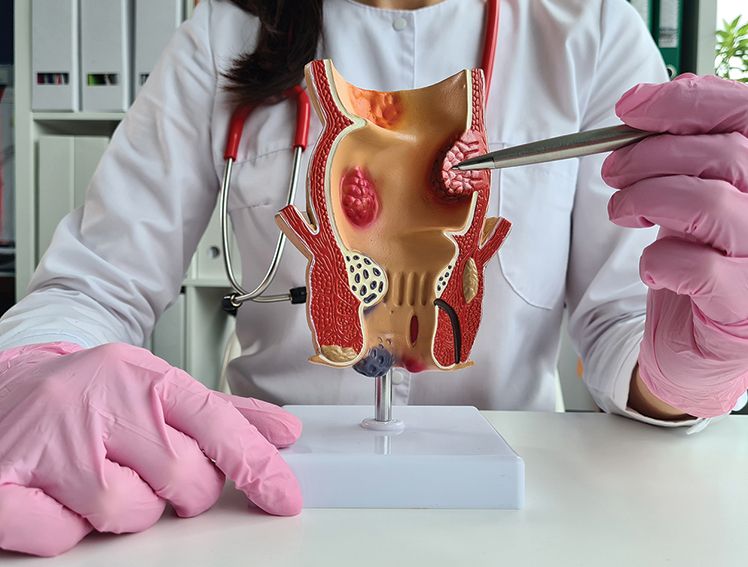
What Symptoms of Colon Cancer Emerge in Men and Women?
Introduction
Your digestive system plays a vital role in your overall health. It helps your body digest and absorb food. Colorecteal Cancer is a disease that can impact your digestive system. It affects the larger intestine. As per World Health Organization (WHO) statistics, 1.93 million new cases of colon and rectum cancer were reported in 2020, making it the third most common type of cancer occurring cancer in men and the second most common type of cancer in women. Before we discuss colorectal cancer, it is essential to learn a little more about the parts that are affected due to this illness – It’s both, the colon and the rectum.
The colon and rectum are two significant parts of the large intestine in our body. The colon is a tube-like structure that acts as a link between the small intestine and the anus in our body. It is the longest part of our large intestine. Its primary function involves the absorption of water, nutrients, and electrolytes from partially digested food in our body. The remaining material, that does not get absorbed, descends into the rectum that acts as a storage for stool until it passes out from the body through the anus.
Cells in our body go through an extensive cycle of growth and division until they die. Complications arise when cells that are supposed to die continue to grow and divide uncontrollably. These continually multiplying cells in the colon and rectum can turn cancerous.
Colorectal cancer can also be termed as colon cancer or rectal cancer, depending on the origin of the illness. Generally, colorectal cancer begins with the formation of small clumps of cells called polyps in the colon. These polyps begin small and grow slowly. Hence, there may not be any symptoms until the polyps grow larger and become cancerous.
Symptoms of colon cancer
- Significant changes in bowel habits
Since colorectal cancer is associated with the digestive system, it is pretty natural that initial signs of cancer will be observed in your digestive system. Your bowel movement says a lot about your digestive health. Any significant change in your bowel movement without any change in your eating habits or medication may signify that you have colorectal cancer.
Here are a few significant changes in bowel habits that could be an indication of colon cancer:
- Constipation- Constipation is one of the most common symptoms of colon cancer. Constipation is associated with difficulty in passing bowels. It is a condition in which your bowel movement is infrequent, generally fewer than three times a week.
- Diarrhea- Diarrhea is another possible sign that you have colon cancer. Diarrhea is a digestive condition in which you pass loose and watery stools and feel an urgent urge to pass stool several times in a day.
- Bowel incontinence- Bowel incontinence or fecal or anal incontinence is the inability to control your bowel movement. This leads to unexpected leaks of stools from the rectum. This is a common condition faced by the older colon cancer patients, especially while passing gas.
- Pen thin stools- If you have been experiencing a narrow bowel movement lately, you might consider seeing a doctor. This is because narrow stools could point towards the presence of a mass blockage in your colon that is restricting the size of the stool passage. This could indicate that you might have developed cancerous polyps which are causing the blockage.
- Blood in stools
This is another change in stools that could signify an onset of colorectal cancer. It can also be one of the most noticeable symptoms of colon cancer. If you see blood in your stools, you should reach out to a doctor immediately. - Unexplained weight loss
Unexplained weight loss is quite common in patients who are diagnosed with cancer. This is because cancerous cells tend to consume more energy than your healthy cells. If you notice a major change in your body weight despite no change in your diet or exercise routine, you should speak with a doctor immediately. - Anemia
Anemia is a condition marked by the scarcity of healthy red blood cells in your body. These blood cells are responsible for supplying oxygen to all body tissues. Most patients who are diagnosed with colorectal cancer are also usually found to be suffering from anemia. This is because the inflammation caused due to cancer reduces the production of healthy red blood cells. - Nausea and vomiting
Nausea and vomiting are also common symptoms experienced by patients with colorectal cancer. The tumors present in the inner abdominal cavity can reduce the intestines’ ability to digest food well, thus causing you to throw up and feel nauseous.
Metastasis
At times, cancerous cells break away from the walls of the colon and rectum to spread to other parts of the body. This could happen either through the bloodstream or lymphatic system. These cancerous cells then settle in various parts of the body and continue multiplying. This spread of cancer cells is called as metastasis.
Colorectal cancer most commonly spreads to the liver. However, it can also reach the lungs, spinal cord, and bones as well. Symptoms, in such cases, tend to be different and more severe than the initial signs.
Here are a few signs that you may notice in case other body parts are affected by cancer:
- Bones- Acute pain in bones, highly susceptibility to fractures, constipation, and high calcium levels.
- Lungs- Shortness of breath, coughing, chest pains and a feeling of tiredness.
- Liver- Constant feeling of nausea and fatigue, swelling of palms and feet, suffering from jaundice, and increased abdominal girth.
- Brain and spinal cord- Feeling confused, difficulty in recall, frequent headaches, hazy or double vision, and difficultly in speaking.
The symptoms of colon cancer in males and females are generally the same. However, along with the symptoms previously described, there may be additional symptoms of colon cancer in females. Women suffering from colon cancer may also experience an irregularity in their menstrual cycle due to anemia. Reach out to a cancer specialist if you observe any of these symptoms of colon cancer. Early detection always improves the prognosis of any disease. Moreover, early diagnosis helps lower the possibility of the cancer getting spread to other parts of the body.
At times, colon cancer may exist without any show of symptoms. Therefore, it is advisable to get screened for cancer regularly, especially if you are above 50 years of age. Cancer screening might begin earlier in case of a personal or family history of cancer. Let’s take a look at a few risk factors of colorectal cancer.
Risk factors of colorectal cancer
There are a few risk factors which can increase your vulnerability towards developing colorectal cancer. If you have any of these risk factors, you may want to get screened regularly for this form of cancer.
- Age- Even though colorectal cancer can impact people of any age, older adults aged 50 years or above are generally more vulnerable.
- History of polyps- Patients who have had cancerous or non – cancerous polyps previously, face a higher risk of colorectal cancer.
- History of inflammatory conditions- If you have a medical history of inflammatory intestinal conditions like - Ulcerative Colitis and Crohn’s Disease, you may be at higher risk of colorectal cancer.
- Family history of cancer- Having a blood relative diagnosed with colon cancer can be a serious concern as this increases your risk of developing this disease.
- Inherited genes- Certain gene mutations inherited from your family can put you at a higher risk of colorectal cancer.
- Radiation therapy- Radiation therapy that is directed towards any part of the abdomen can increase your risk of colon cancer. Radiation therapy is often recommended as a course of treatment for different types of cancer.
- Low fiber and high-fat diet- A diet that is typically low in fiber and high in fat is considered harmful for your digestive health and can increase your risk of developing colon cancer. Leading a sedentary lifestyle too increases your risk of developing many diseases, including colon cancer.
Being obese - Being obese increases the probability of you developing colon cancer, among other diseases.
Diabetes – Living with diabetes or being insulin-resistant can increase your vulnerability for developing colon cancer. - Smoking and alcoholism- Smoking and alcohol addiction both have a negative impact on health and can make you vulnerable to many diseases, including colon cancer.
If any of these risk factors are directly relevant to you, you may want to speak to your doctor immediately. They will let you know how often you need to test for colorectal cancer. As stated earlier, an early diagnosis can greatly improve your chances of recovery. Let’s look at how colorectal cancer is diagnosed and treated.
Diagnosis and treatment of colorectal cancer
There are a number of screening methods employed to diagnose colorectal cancer. You may have to undergo a colonoscopy, CT scan, and blood tests, among other tests as recommended by the doctor. The results of the diagnosis will determine the course of treatment that you need to follow.
The kind of treatment you undergo for colorectal cancer largely depends upon the cancer stage and place of origin of cancer.
Colon cancer surgery
In some cases, patients with colorectal cancer need to undergo surgery. A colon cancer surgery can be performed on a clean colon only. Therefore, all patients are required to undergo the process of a bowel clean out before the surgery.
- Polypectomy- The cancerous part of the polyp is removed by cutting it at the base. Here the wire loop inserted for the colonoscopy is used to cut off the polyp wall by passing an electric current through it.
- Local excision- This is an extensive procedure wherein the inside lining of the colon is removed along with a few healthy tissues of the colon.
These two procedures are minimally invasive surgeries. However, if the tumor still persists, the doctor may recommend a colectomy.
Colectomy
In a colectomy, the entire colon or a part of the colon is removed with a few surrounding lymph nodes.
- Hemi colectomy- In this procedure, the cancerous part of the colon along with a healthy portion of the colon gets removed. In addition to this, a few lymph nodes are removed as well.
- Total colectomy- The entire colon from your body gets removed. This procedure is usually not required unless there is some other issue with the colon, like multiple polyps in the non-cancerous part of the colon or some inflammatory bowel disease. Total colectomy can be done by either open or laparoscopic surgery.
Other methods of treating colorectal cancer include chemotherapy, immunotherapy, and radiation therapy.
- Chemotherapy
In chemotherapy, drugs are given to kill cancerous cells. Many patients receive chemotherapy before they undergo surgery for colorectal cancer. Chemotherapy drugs may be given in the form of a pill or administered intravenously. It may be the only line of treatment or given along with other forms of cancer treatment, such as immunotherapy. - Immunotherapy
Immunotherapy is used to help your immune system fight cancer cells. It helps the immune system recognize and distinguish cancerous cells from regular, healthy cells so that it can kill these cancerous cells. Immunotherapy may be given in combination with another form of treatment for cancer. It is generally recommended only for later stages of cancer. - Radiation therapy
In radiation therapy, radiation is used to kill cancer cells. Radiation therapy is also generally carried out along with another form of treatment, such as chemotherapy. Radiation beams may be internal or external. The choice between the two will depend upon the patient’s medical condition, the size of their tumor, and certain other factors as decided by the doctor.
Preparing for treatment
If you are about to start treatment for cancer, there are a few things that you can do to be better prepared. First, do make a list of a few questions to ask your doctor. You can ask them how long your treatment will continue, whether your treatment will impact your current medications for any other disease, and what side-effects you may expect. Knowing the answers to these questions will help you be better prepared.
You may also want to take a friend or family member along with you during your treatment sessions. They can help you get home safely in case you experience any side-effects or feel weak.
MIRUS Circular Stapler
The MIRUS circulat stapler is designed with great precision and offers great assistance and ease during surgical procedures. This stapler has been designed for sterile single patient use. It ensures better security and superior hemostasis as well as uniform staple arrangement.
Meril is a global medical device company based in India. Since its formation in 2006, Meril has continuously worked towards innovating and developing medical devices that will help alleviate human suffering. Meril works with physicians and researchers to design devices that cater to unmet needs in the medical industry.
Conclusion
Knowing the signs and symptoms of colorectal cancer can help you understand whether you need to seek screening. If you have a family medical history of cancer, it is suggested to get tested regularly. Your doctor will let you know how often you need to get screened and what tests you need to undergo.
Advancements in medicine and medical technology now promise better and improved prognosis for many forms of cancer, including colorectal cancer.



